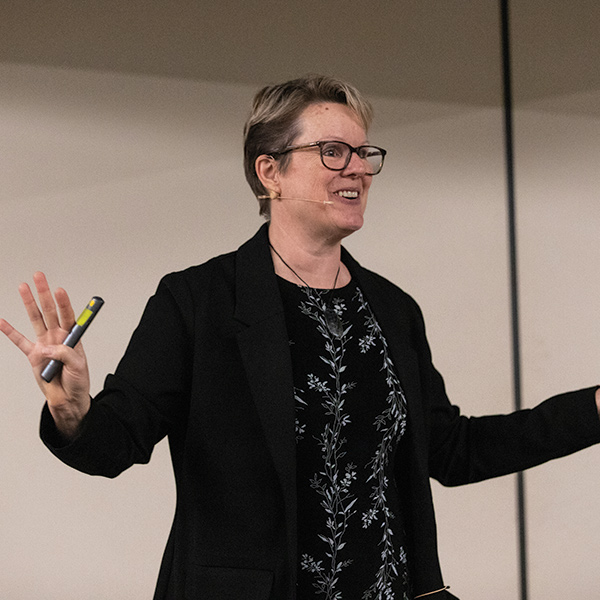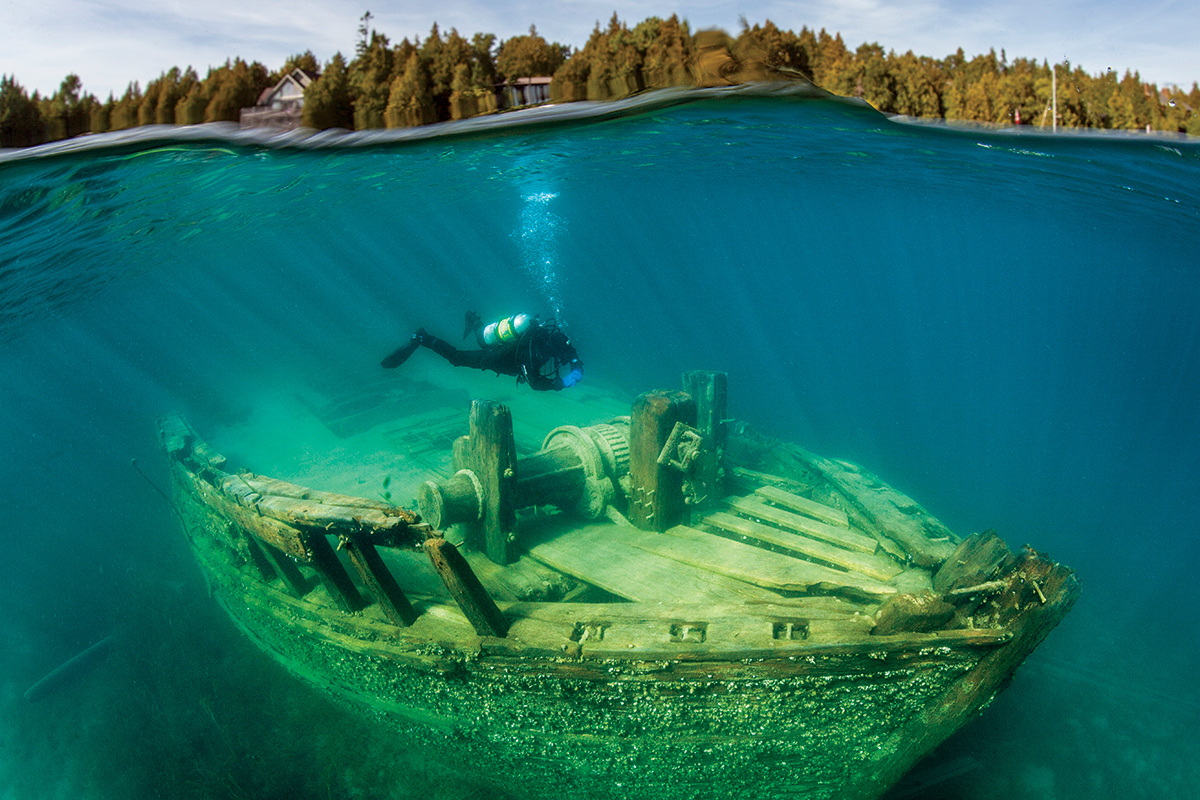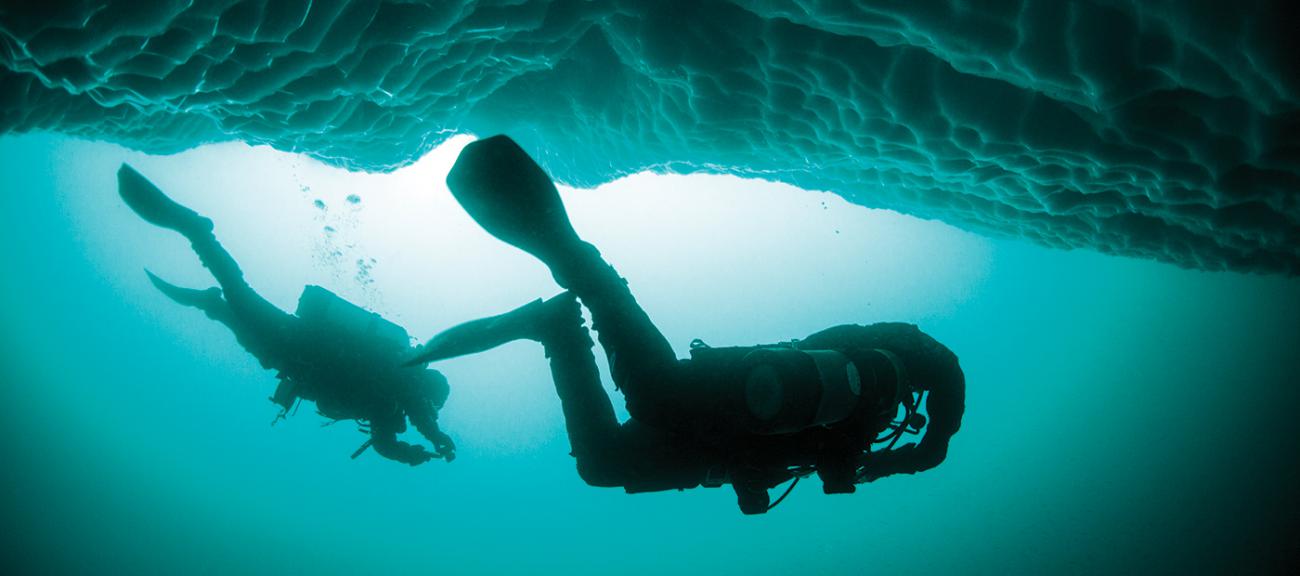For 90 minutes on the evening of March 12 in the Instructional Building on campus, time stood still.
Never mind the news and worry that raged outside the doors. Never mind the knowledge that historic changes were happening faster than anyone could comprehend.
For 90 magical minutes, cave diver Jill Heinerth mesmerized her Lethbridge audience with vivid descriptions, compelling stories and unbelievable images as part of the annual Wider Horizons Presents speaker series, making listeners forget about time, space and stress in much the same way a diver might experience in the deep abyss.
Heinerth’s visit to campus was one of the last events held at the college before sweeping changes moved working, teaching and learning from classrooms and labs to living rooms and basements this spring. The event was made possible thanks to a $100,000 gift from long-time Lethbridge businessman and philanthropist Bruce McKillop, who in 2019 established the annual speaker series and created several student awards.
In addition to addressing students earlier in the day, Heinerth met with the Wider Horizons team to talk about her work inspiring audiences to reach beyond their limitations, challenge the unknown and overcome their fears.

Tell us about an influential teacher and how that person helped shape your path.
I would say my grade 2 and 5 teachers, Mrs. Graves and Mrs. Michaels, were the most influential. I excelled academically but I didn't really fit in socially. Those two teachers became my good friends in those years, and I look back on that now and I realize that mentors and teachers can open doors or slam them for young people. Mrs. Graves and Mrs. Michaels gave me wings. When I asked them for more work, they gave me something to study. They encouraged me at a time when I didn't fit in other ways. It’s so important to know that a single sentence can change the direction of a young person’s life – and these two teachers changed mine.
What advice do you give a young person starting out?
People need to think about creating and controlling their brand. I encourage young people to buy a domain and then start populating that with the image of what they want to put out into the world. When they seek a job or grant, the first thing people do is Google them. Learning to write, create content and present yourself publicly are important skills whether they want to be a plumber or a school principal.
Also, I remind young people that today’s problems seem very big, whether it’s climate change or coronavirus. You may not know the answers to those problems, but you do always know the next best positive step to take in that direction. Find something that gives you fire and passion, and realize no matter what your gender, financial background, culture or upbringing, you can do anything today. You can reach out to the globally interconnected world and ask someone who does what you want to do if they’ll give you some advice. So do anything that gives you job and chase it relentlessly one small step at a time.
Can you tell us about a time you made a choice to change directions or start a second act?
Well, what I am doing now is my second act. I have a Bachelor of Fine Arts in digital design, and after graduation, I started an advertising company and it was very successful. I loved the creative process and loved what I was doing but not where I was doing it – inside my studio all day. I was teaching scuba diving nights and weekends and that was my passion, but I never put it together that I could turn that into a career. And after a couple of years, I decided to just sell or give away everything I owned, I sold the business back to my partners and started literally from ground zero. With a suitcase and my gear, I was 28 years old and moved to the Cayman Islands.
I didn’t know how I was going to do it. So, I just made the next best step. It was scary. My family had freaked out. My university professors were calling me up asking what are you doing? But the moment I got down there and started working, I felt the weight of the world off my shoulders. I think I realized at that point there’s no reason you have to do one thing for the rest of your life. All those things you invested in to get to one point don’t get thrown away – they built who you are today. You can’t change them. What you can do is use them to better inform you about what you want to do next – and find that passion.
At Lethbridge College, we talk about how what happens next matters most. Have you found that to be true in your life and work?
Yes! I think that all of my opportunities that built who I am today happened because I volunteered. Whether it was for an expedition or a project, I would work really hard and go right up to the person in charge and say ‘How can I help? How can I be what you are?’ And that always led to something else…and still does. I mean, I still spend an enormous amount of my time on volunteer work or speculative opportunities. And they, they always open doors. And so always say yes. And always ask for the gig. Never be shy, especially in today's world.
When you introduce someone to diving for the first time, is there something that consistently surprises or delights them (or you)?
It’s the first breath underwater. It’s the most remarkable thing. When someone dives for the first time, they’re never prepared for how much of a revelation the first breath underwater will be. The moment you descend beneath the surface, you are so incredibly focused and in the moment. It’s life changing -every screaming sound in your life disappears, every stress you are facing goes away. It’s a moment of total focus with you are concentrating on breathing. It’s like going to another world- or just getting into yourself in such a different way. It’s transformative.
For some people, that first breath is a struggle. They get water in their mask and start to choke. That’s normal. We’re not meant to be underwater. Well, what you’ve got to do is surrender. And once you stop fighting it, then all of a sudden, it’s as easy as could be. It’s almost like riding a bike where, you know, you fall and fall and suddenly you are riding and wondering why it was so hard. And that’s the same thing with scuba – it’s so transformative. I think it also empowers people to do other things in their lives, to go on and do remarkable things.

How does your work contribute to conversations about climate change? What have you learned by going into uncharted territories that can help us be better stewards of the rest of the planet?
A lot of the work I do is scientific collaborations with researchers in many different areas of science where I become their eyes and hands in an environment that they can't reach. So, a scientist who spent their life specializing to become an astrobiologist or a geochemist probably doesn't have the time to dedicate to the technology of underwater exploration that I do. But when we work together – as an artist and a scientist – I become their eyes and hands. I've worked with paleoclimatologists, biologists, archaeologists, astrobiologists and engineers who are designing and mapping technologies that are destined for space. All of these people look at climate change in different ways. As a result, I’ve become a communicator about that work, about water issues and climate change.
In the midst of this global health threat, how do you not panic? How do you keep moving forward? How do you keep dreaming about what else we can explore?
Most people think I'm fearless because of what I do, and because what I do really terrifies them just because it's unknown. Things that we don't understand are really scary, right? It's okay to be afraid. It means that you care about the outcome. Being afraid gives you an opportunity to learn. I think it behooves everybody to learn as much as they can about what's happening in the world, so they're informed.
Before I go on a dive, I'd make a list of everything that might kill me today. And then I go through my list of equipment and I say, am I equipped to deal with this, am I trained to deal with this, am I willing to execute a self-rescue, and am I willing to take care of my buddy? And if the answer is yes, then I can go into water stress-free, because I've actually rehearsed all the solutions and I know I have everything with me to save my own life.
I think maybe we all need to take that deep breath, take the emotions out of it, and focus on the solutions – knowing I have everything in my toolkit and in my coping toolkit to manage whatever could happen. If I don't, then what do I need to do to learn about what's happening or improve my resilience to what might happen in the future? Maybe that's just going home and exercising or eating better or improving our general health so that we're more resilient against whatever we might be facing health wise.
And maybe the silver lining of Coronavirus is that no one will ever be a be able to look back and say that we are not globally interconnected. Anything that happens in this world can affect me. We are totally connected. And I don’t think that we’re ever going to feel the same after this.
Is there anything else you’d like to add? Anything else you want readers of Wider Horizons to know?
The most important thing to know is, “you get to choose every day.” Employ that explorer’s mindset as you move forward. For your students here at the college…you’re in school, which means you’re an explorer, and that you want to learn and want to improve your opportunities and improve yourself. And that’s exactly where you should be. So just continue to employ that explorer’s mindset as you move forward. We’re really good at it when we are little kids and then somehow, we kind of lose it. Get up every morning and choose what you want to do. It’s your life. Live it fully. And when you find that passion, it’s going to be really rewarding.



